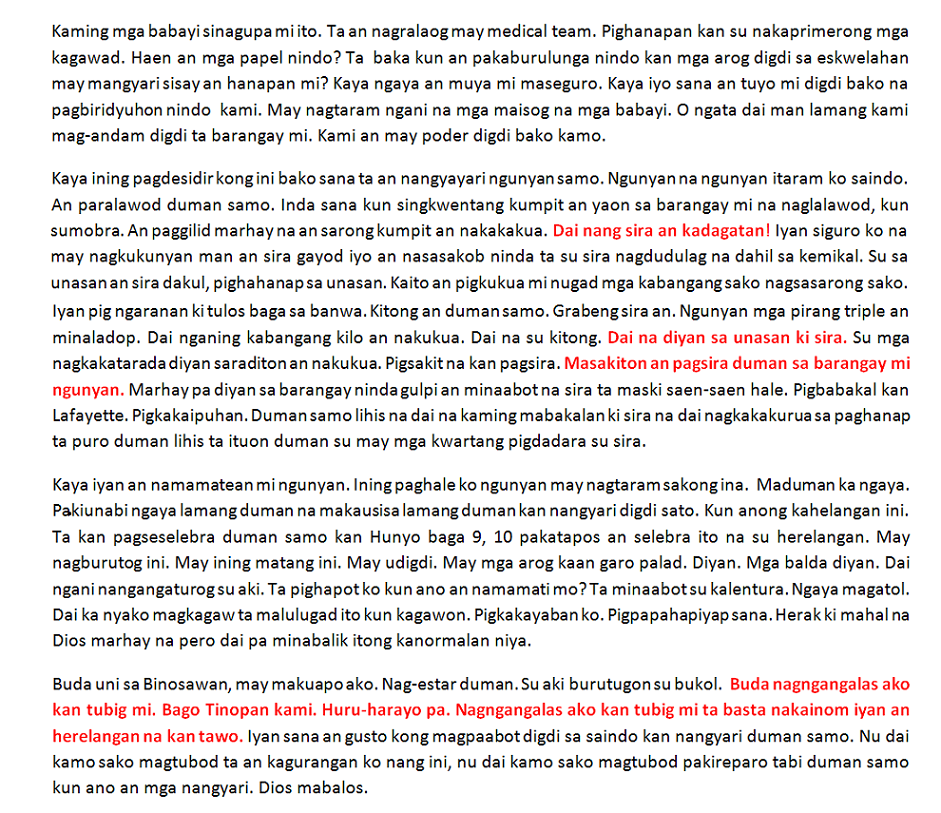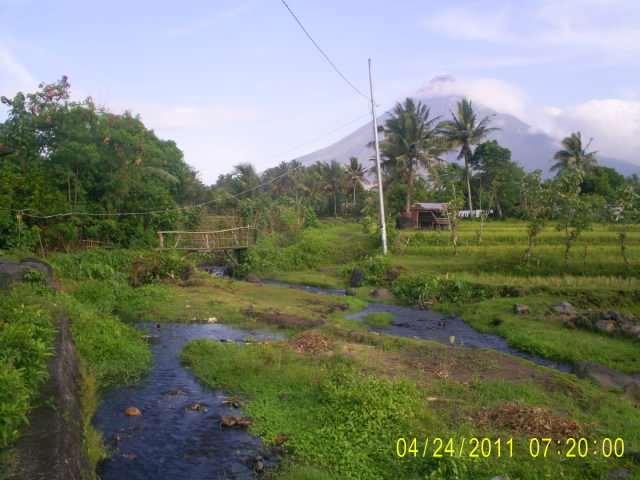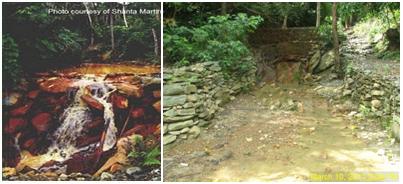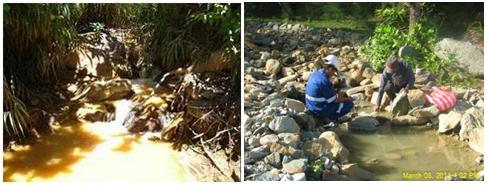CBCP News
Bong D. Fabe
May 13, 2009
CAGAYAN DE ORO CITY, May 13, 2009—The Archdiocese of Cagayan de Oro convenes today (May 13) a forum “Discussion on Alternative Mining Bill” (AMB) at the Archbishop Patrick Cronin Hall in the compound of the St. Augustine Metropolitan Cathedral.
The forum is being convened by the Archdiocesan Social Action Centre and the Legal Rights and Natural Resources Centre-Kasama sa Kalikasan/Friends of the Earth Philippines (LRC-KSK/FoEP) as a parallel activity to the official filing today, May 13, of the Alternative Mining Bill at the House of Representatives by Rep. Lorenzo “Erin” R. Tañada III (Liberal Party, 4th District, Quezon) and AKBAYAN representative, Congresswoman Riza Hontiveros.
Social Action director Rev. Fr. Jose A. Cabantan called on the House of Representatives to support the passage of the AMB, saying “it is now time to scrap the RA 7942.”
“The AMB aims to bring back the exploration, development and utilization of mineral resources within the framework of national development, the right of peoples to self determination, and respect for human rights and the environment,” Cabantan said.
Archbishop Antonio J. Ledesma, S.J., D.D. also joined Cabantan’s call, stressing that after fourteen years of the implementation of the Mining Act of 1995, no solid proof of progress especially in the sites of struggles (SOS, the term used to refer to communities in the mining areas) is evidenced.
“Fourteen years of the implementation of the Mining Act of 1995 had brought about the physical and economic dislocation of many indigenous peoples and other upland rural communities, as well as aggravated the already dire situation of our environment—by handing over our lands and mineral resources for corporate exploitation. All these, in exchange for a grossly disadvantageous amount from mining revenues,” Ledesma said.
Rep. Rufus Rodriguez of this city’s second congressional district had earlier signed the AMB as a sponsor. Also, Rep. Teofisto “TG” Guingona III of the third congressional district of Bukidnon has also expressed support to the AMB.
The AMB, according to LRC team leader for Cagayan de Oro City Carl Cesar C. Rebuta, is the product of years of consultations by the Legal Rights and Natural Resources Center-Kasama sa Kalikasan/Friends of the Earth Philippines (LRC-KSK/FoEP) and its partners in the Alternative law Groups (ALG) with different sectors of society in response to the damages wrought and posed by The Mining Act of 1995 (RA 7942).
“The Alternative Mining Bill is dedicated to countless women and men who have risked, and those continuing to risk, their lives for genuine freedoms,” he said.
According to Rebuta, “the time for change has come” and that the 1995 Mining Act must be repealed because of its many flaws such as
(1) It promotes the exportation of raw minerals without maximizing the benefits of such resources for the Filipino people;
(2) It fails to take into consideration externalities or negative impacts, thus leaving the masses and the local government units to bear the brunt of such impacts;
(3) It prioritizes exploration, development and utilization of resources over and above food security and environmental conservation;
(4) It grants too much power for decision-making to the President, when resources are the only heritage of the Filipino people, meanwhile disempowering local communities through lack of participatory mechanisms;
(5) The law is not consistent with sustainable development;
(6) It grants too many incentives for investments, including confidentiality of information, return of investments, tax-breaks, etc.;
(7) It lacks systems that would ensure payment and compensation of affected communities and local government units;
(8) It fails to provide for punishment and accountability on social impacts, including human rights violations;
(9) It fails to provide a rational and comprehensive benefit-sharing among the stakeholders;
(10) It fails to consider the physical characteristics of the Philippines that is not conducive to industries like these, despite claims that the Philippines has a rich mineral resource, when the country in fact is also a rich agricultural country; and
(11) It allows 100% ownership and control of natural resources to foreigners.
Before the forum, which will official start at 1:30 p.m. today, representatives of the different sites of struggles (SoS, the term used to refer to mining communities) in Mindanao are also holding a motorcade all over the city to gather support from different sectors for their struggles against mining operations and for the passage of the AMB.
The motorcade will pass through the Xavier University where a short program will be hosted by the XUCLA. It will then proceed to the BALAOD Mindanaw office where another short program will be done hosted by BALAOD and KAISAHAN. From there, the motorcade will join the forum at the Cronin Hall.
Afterwards, all forum participants will march to the nearby City Hall to present to Mayor Constantino Jaraula hundreds of signature expressing support to the AMB.
Fr. Cabantan called on all sector of society to support the AMB and to show this support to Congress for the immediate passage of the bill.
“The support of this campaign will not only strengthen the crusade in favour of the Alternative Mining Bill but also in support for the people who are adversely affected by mining operations,” he said.
In 2002, the LRC and other opponents of the 1995 Mining Act, which incidentally is principally authored by President Arroyo when she was still a senator, convened at the historic Rizal Shrine in Dapitan City to discuss issues concerning mining in the country.
That discussion gave birth to the “Dapitan Initiative”, a manifesto signed on October 11, 2002 expressing the policies and principles that should govern the mining industry.
The Dapitan Initiative expressed that the mining industry must
(1) uphold indigenous people's rights and achieve a more ecologically sound, gender-fair, equitable system of resource management;
(2) Everyone should share in the burden of satisfying resource needs primarily through re-using and recycling existing mineral products;
(3) In land and water use, the concerns of food security, which includes food free from pollution, livelihood production, ecological balance, equity, and social justice should always be the priority;
(4) Only resources that are necessary for domestic use and national industrialization should be utilized. We should develop our own human resources and encourage the evolution of our own appropriate technologies. Priority should be given to community-based, community-initiated and community-owned stewardship of resources;
(5) There should be no compromise on human rights, dignity and collective identities.
Also, advocates demanded for the
(1) immediate cancellation of all existing financial and technical assistance agreements (FTAAs), minerals production sharing agreements (MPSAs), exploration permits, and other mining agreements, licenses and other instruments because they are all based on a highly flawed system;
(2) scrapping of RA 7942 (Philippine Mining Act), RA 7076 (Small-scale Mining Act); PD 463, and all related laws that are oppressive to the people;
(3) moratorium on the issuance of large-scale mining permits, licenses, agreements and other instruments for one hundred years;
(4) Rehabilitation, restoration of mining areas and accountability of mining corporations for the destruction that they caused;
(5) Upholding workers' rights; and
(6) Prohibiting state and privately sponsored armed groups from areas where there are current and prospective mining operations.
Since that historic signing of the Dapitan Initiative, Rebuta said that various efforts were made to engage and challenge the government, the international finance corporations, the transnational mining corporations, the mining industry and other key players to expose the wrongs and failures of the law and the policy, their implementation and the practices involved in the mining industry.
And all these efforts now come to a head with the official filing of the Alternative Mining Bill in Congress today, May 13, 2009.
































































































































No comments:
Post a Comment